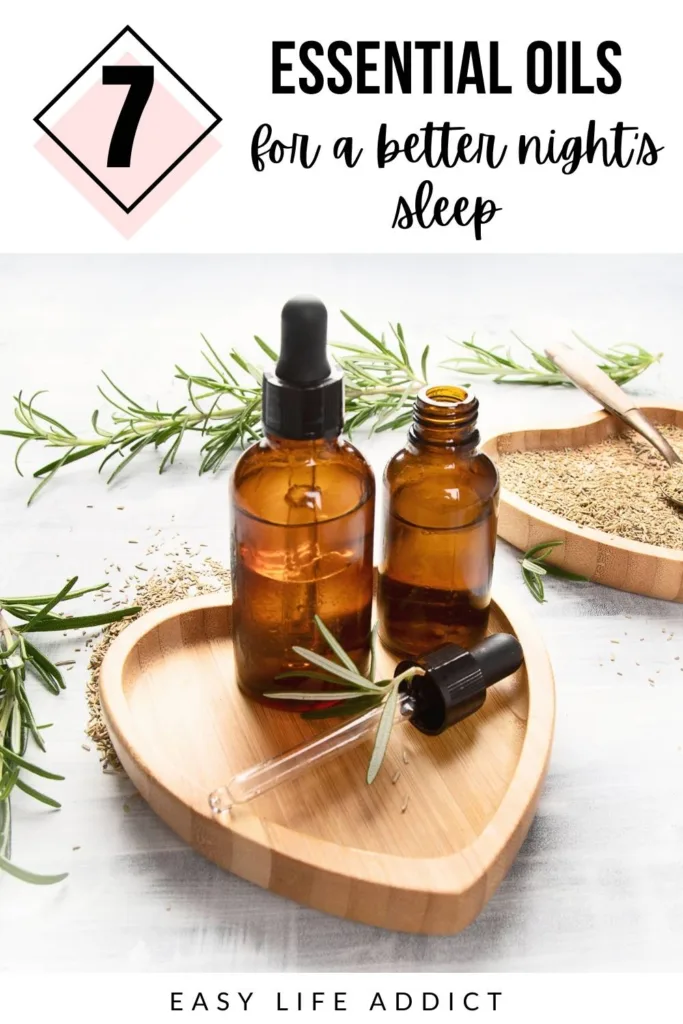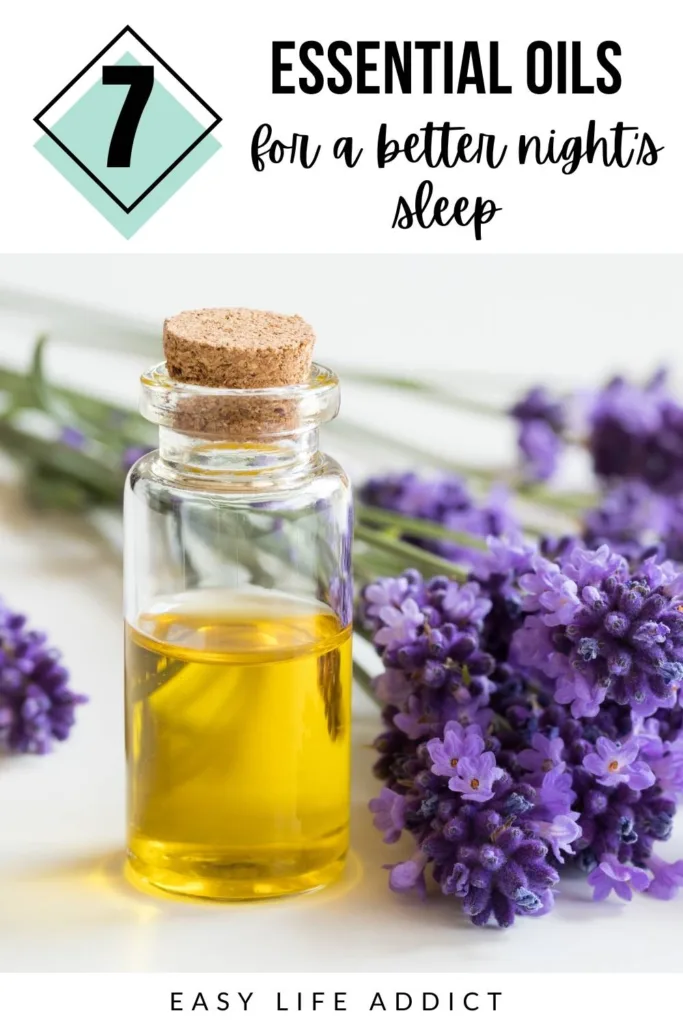7 Essential Oils for a Better Night’s Sleep
A good night’s sleep is essential for our overall health and well-being. But for many of us, falling asleep and staying asleep can be challenging. Luckily, some natural solutions can help. One of those solutions is using essential oils.
There are various essential oils that can promote relaxation, and help beat insomnia. In this blog post, we’ll share 7 of our favourite essential oils for a better night’s sleep. We’ll also give you some tips on how to use them so you can get the most out of their benefits. So, if you’re looking for a natural way to improve your sleep, read on!
This post may contain affiliate links. That means that if you click on a link and purchase something I recommend, I will receive a small commission at no extra cost to you. As an Amazon Associate, I earn from qualifying purchases. This helps keep my website up and running and is very appreciated. Thank you for your support! You can read my full disclosure policy here.
There is no substitute for a great night’s sleep! If it’s just one or two nights, you can usually get by drinking copious amounts of coffee, but more than that, it can become a problem.
The daily stresses of life, whether family issues, work commitments, financial problems or even health worries, can all take their toll and leave us tossing and turning all night! However, a few things can help, and one of my favourite ways to help me relax when I can’t sleep is to use essential oils!
Using essential oils for a better night’s sleep is a great natural way to help the body relax and switch off. Essential oils have been used for centuries as natural remedies to enhance health and well-being. The use of fragrance to affect mood has long been recognised and is now well-established with aromatherapy.
There is an art and science to using essential oils. Many laboratories worldwide are researching and carrying out clinical trials to enhance our understanding of how they work and the best way to use them!
Please note: The contents of this article and blog should not be considered medical advice.
What are Essential Oils:
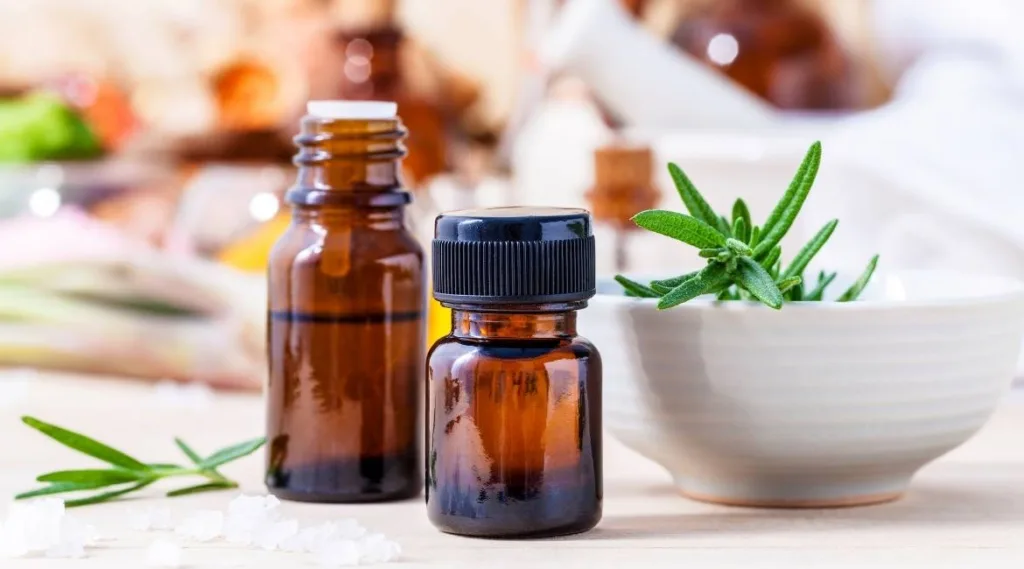
Essential oils are highly concentrated essences derived from plants. These oils contain a plant’s therapeutic properties that can help restore balance to the mind, body, and soul.
Almost all plants contain essential oils, all with various properties and unique therapeutic benefits. In some plants, oil is extracted from the seeds, peel or resin and others from the leaves, bark or flowers.
A single essential oil can contain as many as 100 chemical compounds, which give each oil its distinct aroma. Some compounds are more dominant than others, and this will determine how the oil affects the mind or body. For example, methanol is a major component of Peppermint oil, at around 40%.
Each of these compounds can be broken down further into oxygenated and hydrocarbons.
Oxygenated compounds tend to be stronger scented and last longer. Examples include alcohols, esters, and ketones. Alcohol is antibacterial and can be found in ginger and juniper oils. Esters are antiseptic and can be found in basil and clove. Ketones, which are known to rejuvenate cells, can be found in rose and camphor.
Hydrocarbons, on the other hand, can be found in oils such as myrrh and have a wide range of properties, such as being antiseptic and anti-inflammatory. However, they can spoil quickly when exposed to air.
However, essential oils should be used with caution. Not all essential oils are good for you and may even be toxic depending on their use! Thujone is one of the most toxic members of the ketone family. It can be an irritant and neurotoxic when taken internally, although when inhaled, it can stimulate the immune system and help with respiratory distress.
How do Essential Oils Work:
Essential oils work in two main ways: inhalation and absorption. The quickest way is to inhale their aroma, which has a direct effect on the brain. Oils absorbed into the skin via massage or bath tend to have a more holistic effect.
Inhalation:

Our sense of smell is thought to be the strongest of all senses. Humans are supposed to be able to distinguish between more than 10,000 different aromas! It’s believed that those who have lost their sense of smell are more prone to developing depression and anxiety.
Studies suggest that inhaling a scent has an immediate effect on the brain. The inhaled molecules reach our receptor sites, one of which is called the limbic system, also known as the ’emotional switchboard’. This area of the brain controls our heart rate, blood pressure, breathing, memory, stress levels, and hormone balance, thus having a direct effect on our mood and emotions.
Essential oil molecules can also be inhaled through our nostrils into the lungs, where they enter the bloodstream. Once in the bloodstream, these tiny molecules are carried around the body via our circulation system providing healing effects along the way.
Absorption:

Diluted essential oils can be absorbed into the bloodstream via the skin. The amount absorbed depends on many things, such as the oil’s temperature, skin type, and condition.
When essential oils are combined with massage, the therapeutic effects can be enhanced. The act of massage in itself can produce a state of deep relaxation. When you are stressed or emotional, your body is usually flooded with hormones that can keep you awake, putting you in a fight-or-flight state.
When you have an aromatherapy massage, you inhale and absorb the essential oils’ healing properties and the therapeutic benefits of massage. The relaxing effect of an aromatherapy massage can help the body’s systems rebalance and trigger the body to release feel-good endorphins that will make you feel happier and calmer, thus helping you relax and ensuring a proper night’s sleep!
Warning: Do not ingest essential oils: this can be extremely dangerous, and this method should only be used when specially trained physicians and pharmacists prescribe and dispense them.
7 Essential Oils for a Better Nights Sleep:
Lavender:
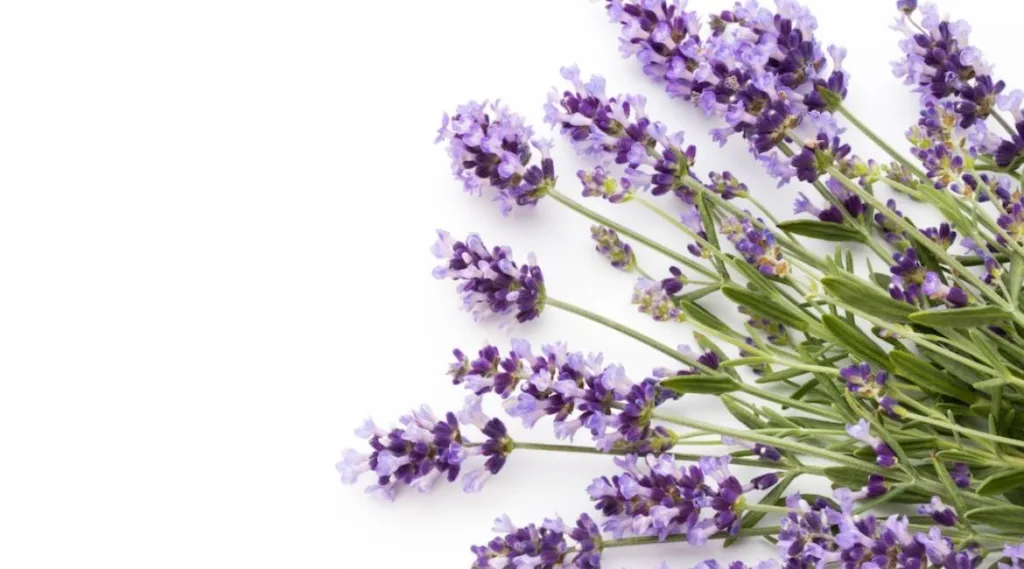
Lavender is well known for its sleep-inducing benefits. A versatile and popular essential oil, lavender has a calming fragrance, which can also help reduce anxiety and aid restful sleep.
Best uses to aid sleep – Room sprays, candles and as a bath soak.
Safe usage – Non-toxic and non-irritant.
Vanilla:

Most people think of vanilla as a baking ingredient, but as an essential oil, it’s also a great stress reliever. Its sweet aroma can help dispel feelings of negativity and anxiety, and its uplifting properties are thought to have an aphrodisiac effect.
With its strong scent, only a small amount is needed.
Best uses to aid sleep – Use in a diffuser or candle.
Safe usage – Non-toxic and non-irritant.
Chamomile:

Camomile is not only a great herbal tea, it’s also a very popular essential oil. It usually makes an effective skin treatment, but its soothing properties can also help calm irritability, nervousness and tension headaches, helping to promote relaxation and restful sleep.
Best uses to aid sleep – As a bath oil or massage oil.
Safe usage – Non-toxic and non-irritant when diluted.
Rose:

Rose has been a popular essential oil since antiquity and is well known for its calming, uplifting aroma. Its mild detoxicating and antiseptic properties can also relieve pain and nausea. Rose is not usually the first essential oil to think of to aid sleep. However, its calming effects can take the edge off stress-related conditions, thus helping the body relax before bedtime.
Best uses to aid sleep – As a massage oil
Safe usage – Rose Absolute is non-toxic and non-irritant. However, use 1% in dilutions due to high methyl eugenol content.
Jasmine:
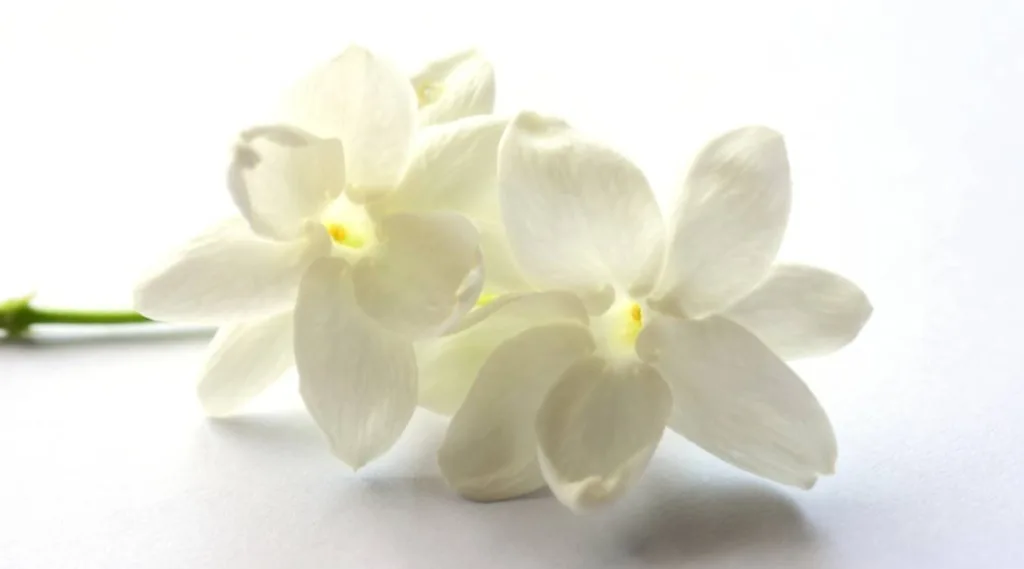
Fresh and floral, jasmine’s aroma instantly uplifts, so it’s often used as a perfume. However, its uplifting scent can also help relieve tension, stress, and anxiety and dispel feelings of negativity, which we can all agree can contribute to a bad night’s sleep!
Best uses to aid sleep – As a perfume or room spray.
Safe usage – Non-toxic and non-irritant.
Bergamot:

Similar to Jasmine, Bergamot is often used in colognes. Its fruity aroma acts as an antidepressant by balancing mood and easing anxiety.
Best uses to aid sleep – As a massage oil.
Safe usage – It is non-toxic and non-irritant in dilution. Ensure you buy bergaptene-free (FCF); otherwise, it is phototoxic.
Ylang Ylang:
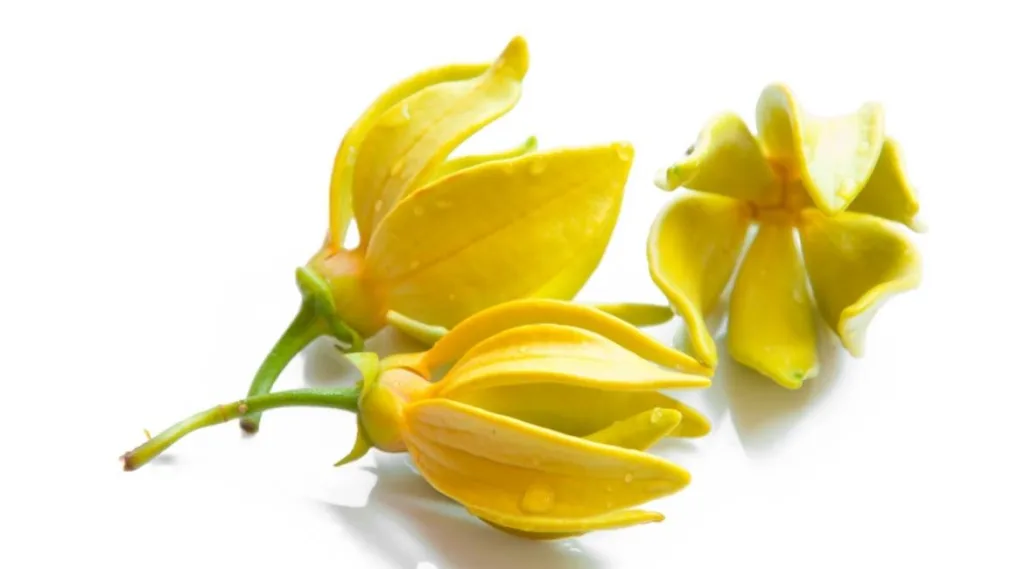
With its exotic floral aroma, ylang-ylang is both uplifting and relaxing. This means increased feelings of well-being and calming properties that can help lower blood pressure and decrease breathing rates, thus reducing anxiety. Its sedating properties, alongside its calming effects, can also help with depression and tension.
Best uses to aid sleep – As a massage or bath oil.
Safe usage – Non-toxic and non-irritant. It has a powerful odour, so use it well-diluted.
How to use Essential Oils for a Better Night’s Sleep:
There are many ways to enjoy essential oils, especially if they are used to help you sleep better. Some of the most beneficial methods include a long hot soak in a luxurious aromatherapy bath or an oil-infused massage.
Some of the best ways you can use essential oils for a better night’s sleep include:
Adding essential oil to a bath – Blend essential oils with carrier oil before adding to the tub. This helps the oils dispense in the water and also moisturises the skin. I usually add 5-10 drops of essential oil with a tablespoon of coconut oil. You can also add a few drops of oil to a tablespoon of full-fat milk. This helps the oil disperse evenly but without the moisturising effects. Add the oil to the bath once run to reduce the chance of the vapours evaporating in the heat.
Steam shower – Add 5-8 drops of essential oil to a warm, damp flannel and, if possible, hang the flannel at face level to fully enjoy the aroma. Do not use this flannel to wash your skin, as the oil could irritate it.
Steam inhalation – Add 2-3 drops of essential oil to a bowl of hot water and place a towel over your head. With your eyes closed, slowly breathe deeply for around 10 minutes or until there is no more steam. Caution: Do not use this method if you have asthma or epilepsy.
Use in a diffuser – First, add some water to the hotplate and then a couple of drops of essential oil. For electric diffusers, use them according to the manufacturer’s instructions.
Make your own mist spray – Add 20-30 drops of essential oil to 2 tablespoons each of mineral water and vodka and transfer into a sterilised atomiser bottle. Use this mist spray in the bedroom to create a calming atmosphere.
Scented candles – There are thousands of varieties of essential oil-infused candles on the market, but why not try making your own? My lavender-infused wax melts and sachets are perfect for encouraging a great night’s sleep. The process of making them can also be very therapeutic.
Have a massage—An essential oil-infused massage is one of the best ways to relax before heading to bed. Mix an aromatherapy blend with the following ratios: 2.5% essential oil with a light carrier oil such as almond, grapeseed or coconut for sensitive or damaged skin. Use 5% on normal skin. If you don’t have anyone to massage you, why not try using a 1% blend and giving yourself a facial massage? Just be careful around the eyes.
Safety Information When Using Essential Oils:
- Essential oils in the undiluted form are highly concentrated and intense and can irritate your skin. DO NOT APPLY undiluted essential oil to your skin.
- Some people experience an allergic reaction to essential oils. Testing is recommended before using any new oil. You can do that by applying a few drops of diluted oil to the skin on your inner arm, covering it with a bandage, and checking for skin irritation over the next 48 hours.
- If you are unsure of what you are doing, then please buy diluted oils from your local health shop.
- Also, if you are pregnant or breastfeeding, be sure to speak with your healthcare provider before using essential oils.
- Again, Do not ingest essential oils; this can be extremely dangerous, and this method should only be used when specially trained physicians and pharmacists prescribe and dispense them.
If you would like more information on the safe use of essential oils, please read these guidelines.
Final Thoughts:
If you’re looking for a good night’s sleep, consider using any essential oils mentioned. Lavender oil is a great place to start because it’s been shown to be one of the most effective oils for promoting relaxation and reducing stress levels. However, if you don’t like the smell of lavender or it doesn’t seem to work for you, try experimenting with other options until you find an oil that helps you get the restful slumber you need. What are your favourite essential oils for getting a good night’s sleep?
Always be careful when using essential oils, as they can be very potent. Always dilute any essential oil with a carrier oil before using it on the skin, and do not ingest it. Always check in with a doctor if sleep problems persist, and speak to a qualified aromatherapist if you have any questions or concerns when using aromatherapy.
Remember to check out our related resources for more tips and guidance on leading a healthier lifestyle. Take control of your life and embrace a brighter future!
Thanks so much for stopping by; I appreciate everyone who takes the time to read and make it to the end! I have lots of exciting new content in the next few weeks, so make sure you pop back to catch up!
